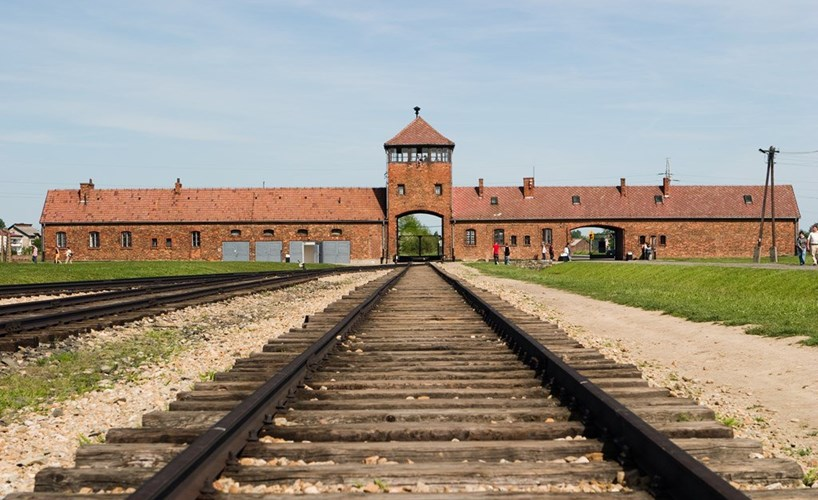The 75th anniversary of the liberation of Auschwitz (photo above) should be used “to come before God in worship, conscious of our need for forgiveness, but committed to action that would seek the common flourishing of all”, the Archbishop of Canterbury has said.
In a statement released this week, in advance of Holocaust Memorial Day on Monday, Archbishop Welby said: “The Holocaust, the Shoah, remains a unique stain on the history of Europe, and a chilling reminder to me of how millennia of Christian anti-Jewish hatred could provide a seedbed for such evil.”
The Council of Christians and Jews (CCJ) has released a prayer for this year’s Holocaust Memorial Day. It was launched at an event in the House of the Lords on Monday, where it was read by the Bishop of London, the Rt Revd Sarah Mullally.
The chair of the CCJ, the Bishop of Lichfield, Dr Michael Ipgrave, said: “Through prayer, we will be asking Christians to remember the pains of the past, and to recommit to a better future for all people, and, in particular, of course, to commit themselves to combating anti-Semitism, which is such a scourge in our society and our world.”
The chief executive of the Holocaust Memorial Day Trust (HMDT), Olivia Marks-Woldman, said: “This year, we reflect on the theme ‘Stand Together’. In the run-up to the Holocaust, and in each subsequent genocide, perpetrators took deliberate steps to stop their designated victims living, studying, and working alongside their neighbours. Communities were stopped from being together.
“And, today, we know that prejudice and hostility based on faith or identity is still prevalent in many areas. Indeed, in some cases, it is even on the increase. We need to show solidarity to others.”
She encouraged people to use the HMDT’s resources to remember individual lives lost in the Holocaust: “The Nazis attempted to destroy completely entire groups of people, stripping them of their identity. Today, we can all take one simple action to remember them as unique individuals who had hopes, family, and friends. . .
“Please include the CCJ prayer in your congregation, use the resources that have been developed, contribute to our remembrance of those who were murdered, and give back the names and the dignity to all those who were murdered.”
The Moderator of the Church of Scotland, the Rt Revd Colin Sinclair, said: “It [solidarity] is a rallying call to resist all those who would encourage a way of thinking to create caricatures and to reinforce stereotypes that polarises people into ‘us’ and ‘them’.
“And, in so doing, [they] deliberately fracture societies, marginalise certain groups, and shape the climate whereby propaganda, fake news, and urban myths are allowed room to grow. And this lead to exclusion, discrimination, and, at an extreme case, can justify cruelty, violence, or even genocide.”
A prayer has been written by the Senior Rabbi of Masorti Judaism, Rabbi Jonathan Wittenberg, which reads: “There inhabits over Birkenau 75 years afterwards, over the remains of electrified fences, over the wooden huts — shacks which testify to cold, disease, starvation, and dying — over the cracked concrete floors and broken-down ceilings of the gas chambers. . .
“In the quiet, which extends into the flat fields and birch trees past where relatives of survivors, pilgrims, visitors wander bewildered; in the silence which spreads over the marshes where the ashes were poured, there inhabit the disembodied voices of the murdered, calling without words, in languages only the heart can interpret, calling to God, calling to the presence of God within us: ‘Are you there? Do kindness, love, humanity exist? Where are you now, in a world once again hate-filled, full of refugees, replete with disregard? Is God there?’”
In a message written for the launch of the CCJ prayer, the Chief Rabbi, Ephraim Mirvis, said: “Despite all the challenges that contemporary society faces, I remain optimistic because of the work of organisations like the Council of Christians and Jews. Its work to cultivate dialogue, promote respectful engagement, even on the most challenging of topics, should provide us all with great cause for optimism.
“The theme of this year’s Holocaust Memorial Day is Stand Together. If you are reading this, it is because you have already made a commitment to stand together with the Jewish community and with those of all faiths and none, in commemorating the Holocaust. For that, I offer you my deepest gratitude. By taking the time to learn about what can happen when hatred is left to develop unchecked, you have helped to ensure that it can never happen again.
Report by Adam Becket in the Church Times
DraggedImage.298da589c68442d3ada99a5cd02748c0.png



